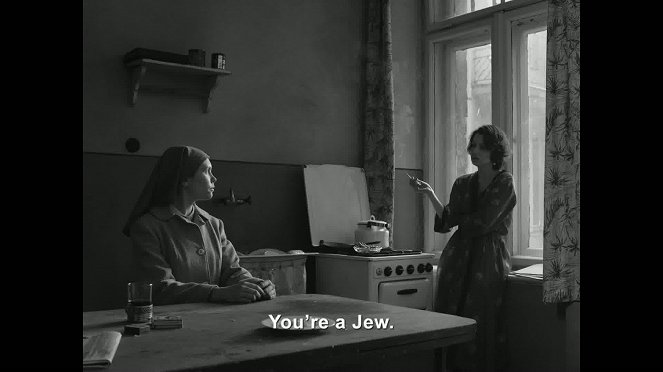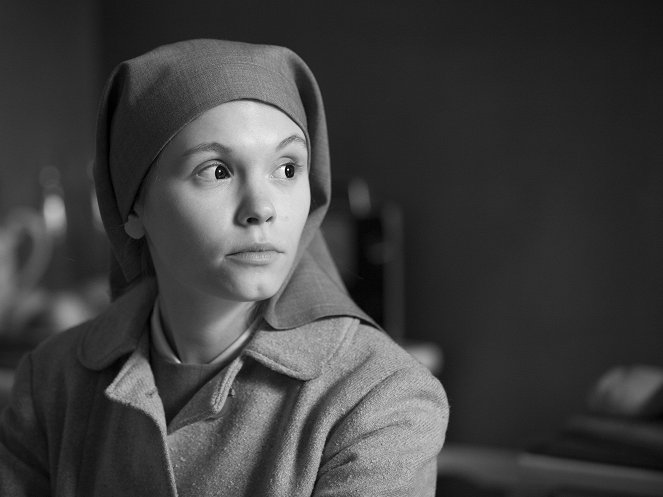Réalisation:
Paweł PawlikowskiMusique:
Kristian Eidnes AndersenActeurs·trices:
Agata Kulesza, Agata Trzebuchowska, Dawid Ogrodnik, Jerzy Trela, Adam Szyszkowski, Halina Skoczynska, Joanna Kulig, Mariusz Jakus (plus)Résumés(1)
Dans la Pologne des années 60, avant de prononcer ses voeux, Anna, jeune orpheline élevée au couvent, part à la rencontre de sa tante, seul membre de sa famille encore en vie. Elle découvre alors un sombre secret de famille datant de l'occupation nazie. (Memento Films Distribution)
Vidéo (3)
Critiques (8)
Un hommage au cinéma des années 60, en noir et blanc et tourné dans un format 4:3, et en même temps un retour du réalisateur Pawlikowski sur la scène cinématographique polonaise. L'histoire d'une jeune novice (avant de devenir une religieuse) qui part en road trip avec sa tante dans le but de découvrir la tombe de ses parents et de se retrouver elle-même, n'est pas très attrayante et encore moins imprévisible. En revanche, le visuel du film vaut le détour. Ida est un film modeste et pur, qui met l'accent sur la psychologie des personnages et l'esthétique de l'image. Il est captivant la première fois, mais ne suscite pas autant d'intérêt au second visionnage.
()
Une très belle œuvre visuellement parlant, qui suit son cours tranquille. J’ai apprécié deux choses en particulier : l’excellente prestation des deux Agata et la façon dont est construite l’ambiance prenante de la Pologne des années soixante du siècle passé. Et comme l’a déclaré lui-même le réalisateur à l’occasion de la projection, ce n’est pas un film pour les masses.
()
Don't worry. A muted account of the traumas of history, an intimate detective story about identity and a film that deceives through its name, because the core of its power lies not in the beautiful but passive eyes of the nun, but in the electrifying character of Aunt Wanda (yes, this is a character no one here would want to play or write because she is a communist and is not portrayed as a lefty from hell). Pawlikowski looks at his characters through obsessively arranged frames, in which new-wave nostalgia, sacral chiaroscuroes and, in some places, the Kaurismäkie dance retro all meet. There is a bit of mannerism in it, and at the same time the film achieves a noticeable distance, which on the one hand is detrimental (it may be too withdrawn), on the other hand beneficial (the film does not fall into sentiment and defending / judging historical injustices and excessive psychologization). Ida is an extraordinarily clean and understandable (which is rare) shape that hides much of the drama beyond what is shown. It remains very strict and pleasantly reserved until the last moment. In a good way, a "noble" film that is always needed. [80%]
()
Big topic are "seeming randomly" addressed in an intimate and subtle way (these big topics overlap not only through character of Wanda with what we shall address in the Czech republic) with an unprecedentedly refined, coldly reserved visual side. And this visual side is surprisingly the biggest stumbling block, because each shot is so magnificently composed that the image steals the show. And it's never good. In other words, surprisingly, despite the rich and high-quality content, "the form overshadows the content" to a larger extent.
()
The case of Pawlikowski and Ida shows in practice the validity of the age-old maxim that talent without a theme is nothing, or rather that the most impressive works are created when the creators look into themselves and focus on personal themes. Before Ida, Pawlikowski was a solid, but in no way essential, filmmaker with a long career in essayistic documentaries for the BBC and in independent genre-festival circles. Ida reflects his own renaissance as a man and artist in connection with tragic events in his family life and the apparent balance of his own identity and existence as an emigrant whom his mother took from Poland to Great Britain when he was an adolescent. Pawlikowski conceived Ida as a reflection of Poland with its ethically problematic history and injustices perpetrated against others, which, unlike the film and its heroine, the country has never dealt with. Through the personal dimension, however, Ida does not fall into the historical thesis of guilt, but instead remains an intimate film about freedom, the crossroads that one comes to in life and the power of personal choice, regardless of how impermissible that choice may seem with respect to categories. At the same time, the chosen stylisation with the use of a classic format and black-and-white picture is an open tribute to cinema at the time in which the film is set, while concurrently using the existing expressive lexicons for its own ends (as is clear not only from the conceptually meaningful use of static and moving shots, but also from the claustrophobic framing, which gradually transforms into details at the close of the film). It remains a paradox that following global success and an Oscar victory, Poland appropriated as its calling card a film about accepting and coming to terms with the past, and thus discovering new strength for one’s own life, i.e. things that Poland’s society and government essentially refuse to do.
()



Annonces